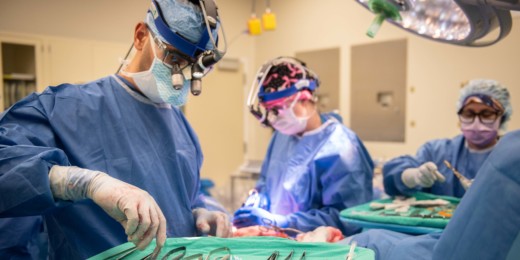"You're only as old as you feel" isn't really applicable to routine medical screening, I'm finding (somewhat ruefully). Lately it seems that each birthday comes with a new, ever-more-fun, recommendation from my doctor.
Most recently we discussed colonoscopy. Although it's probably safe to say that they aren't anyone's favorite experience, the procedure -- in which a colonoscope is used to examine the rectum and colon for signs of cancer -- can save lives by diagnosing and even preventing age-associated colon cancers through the removal of precancerous polyps. The process sounds more intimidating than it is -- most people undergoing a colonoscopy have no discomfort and realize that it was not what they had feared.
Currently, most medical organizations recommend screening for colorectal cancer at regular intervals beginning when a person turns 50. In 2018, however, the American Cancer Society reduced their recommended age to 45 -- a change that gastroenterologist Uri Ladabaum, MD, predicted via a computer simulation in 2019 could save lives with an acceptable increase in health care costs.
Halving the risk of colorectal cancer
Now Ladabaum, data analyst Maanek Sehgal and colleagues have the real-world data from nearly 3 million people to show that initiating colonoscopy screening between the ages of 45 and 49 halves the risk of subsequent development of colorectal cancers. They published their findings recently in Gastroenterology.
"This is some of the first real-world data on the association between colonoscopy between the ages of 45 and 49, and the subsequent incidence of colorectal cancer," Ladabaum said, "and it validates the expectation that screening should work in this younger age group just as it does in older people, which was a critical assumption underlying the computer simulation in our previous paper."
The researchers hope that their study will be considered by other organizations as they update their screening recommendations, including the United States Preventive Services Task Force, which is expected to issue final updated recommendations this year following its draft recommendation in October.
Screening challenges
Ideally it would be possible to predict a person's individual risk -- and when to begin screening -- for colorectal cancer based on more than just their age, which is, after all, just a number. But although we know that smoking or obesity, among other factors, are associated with increased risk, it's still too difficult to use this information reliably to guide clinical recommendations at this time, Ladabaum has argued.
"Sometimes keeping it simple is better, rather than risk confusing people and their doctors with a lot of variables, which may actually reduce participation in routine screening," he said in a 2019 post by my colleague Mandy Erickson. Ladabaum is hopeful that risk stratification may become more reliable and practical in the future.
Increasing participation is important to saving as many lives as possible. However, some people are reluctant to agree to a colonoscopy, which often requires time off work and light sedation. Although Ladabaum and Sehgal only studied colonoscopies, there are other, non-invasive stool-based tests that have been approved by the Food and Drug Administration to screen for colorectal cancers. These tests, like FIT or Cologuard, can be performed at home.
"Some worry that opening up screening to the younger group will mean that we forget about older unscreened persons, including those in vulnerable populations. I believe it's possible to encourage younger people, as well as people over the age of 50, to be screened, especially if we broaden the use of FIT and other alternatives," Ladabaum said.
Colorectal cancer warning signs
Ladabaum emphasized that, regardless of screening recommendations, no one should ignore symptoms like rectal bleeding, unusual abdominal pain, or sustained change in bowel function. People who obtained a positive result on one of the non-invasive tests should have a follow-up colonoscopy as soon as possible, and not delay care due to the ongoing COVID-19 pandemic. "There is evidence that delaying colonoscopy by ten to 12 months after a positive FIT result is associated with a worse outcome," Ladabaum said.
Image by Wikimedia






